【单元考点培优】Module 2 Public holidays 专题05 翻译题-2025-2026学年九年级英语上册单元复习考点培优外研版(含答案解析)
文档属性
| 名称 | 【单元考点培优】Module 2 Public holidays 专题05 翻译题-2025-2026学年九年级英语上册单元复习考点培优外研版(含答案解析) |
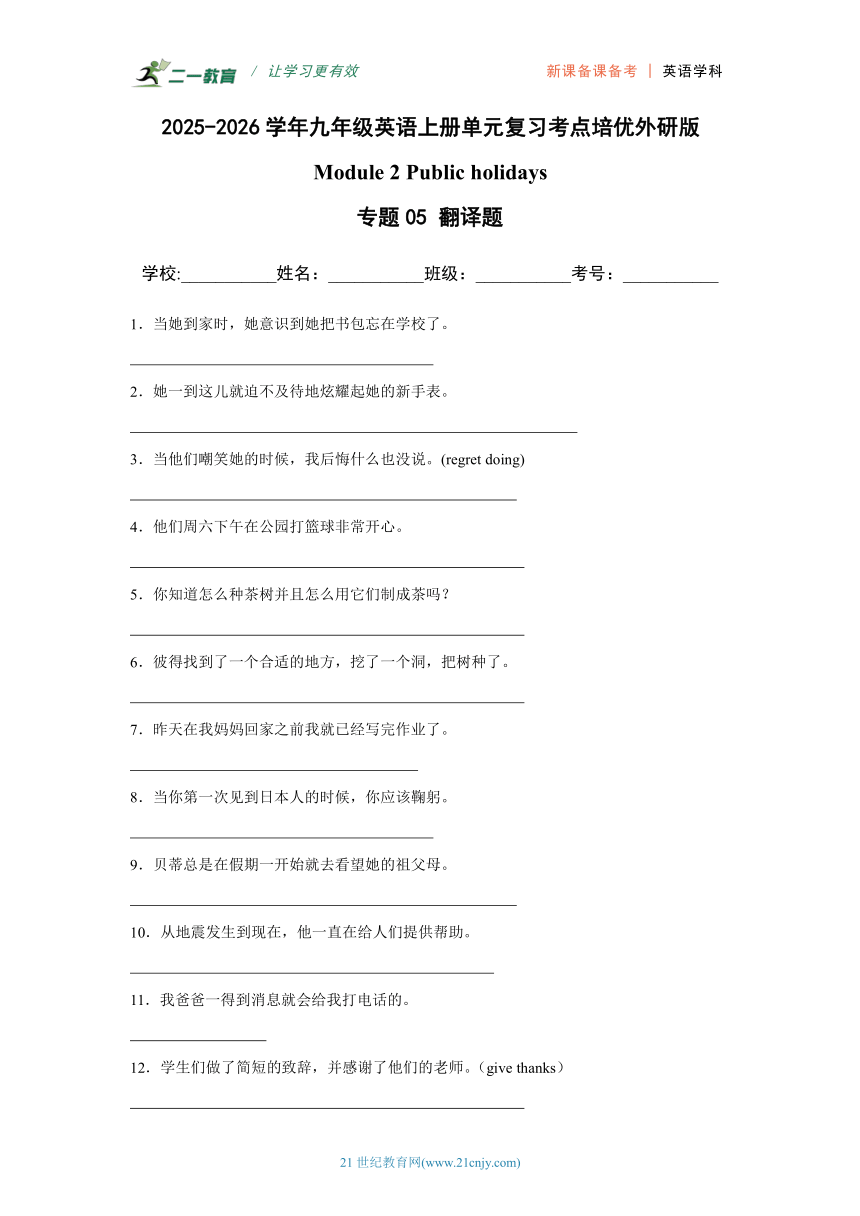
|
|
| 格式 | docx | ||
| 文件大小 | 54.5KB | ||
| 资源类型 | 试卷 | ||
| 版本资源 | 外研版 | ||
| 科目 | 英语 | ||
| 更新时间 | 2025-07-31 15:15:41 | ||
图片预览

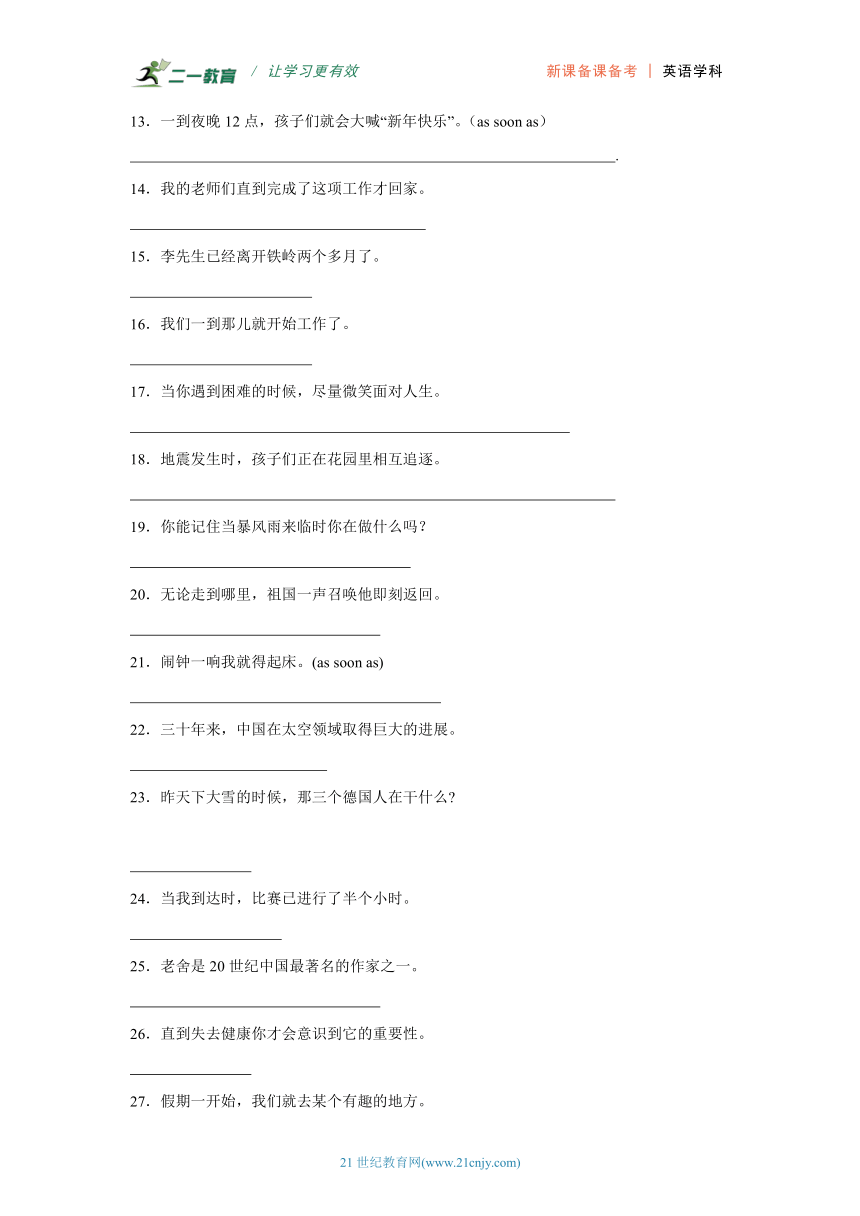
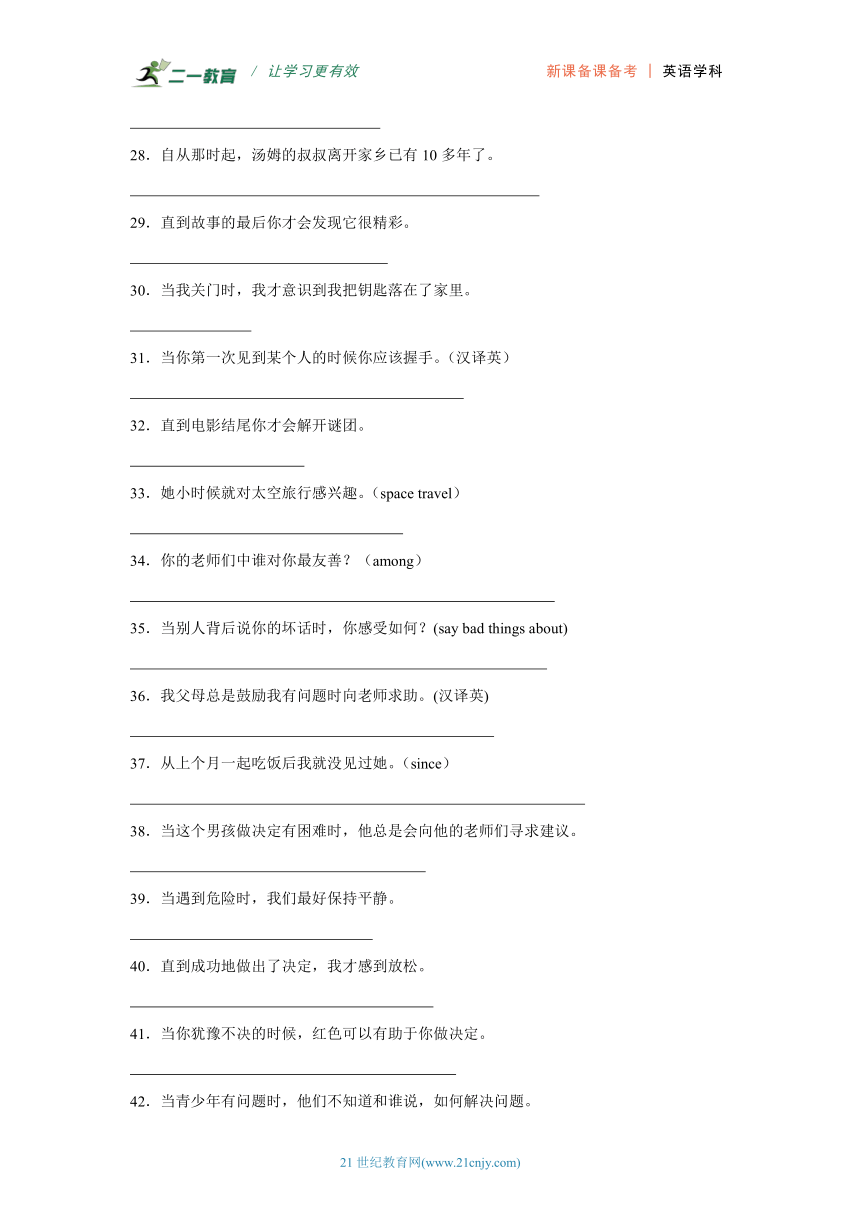
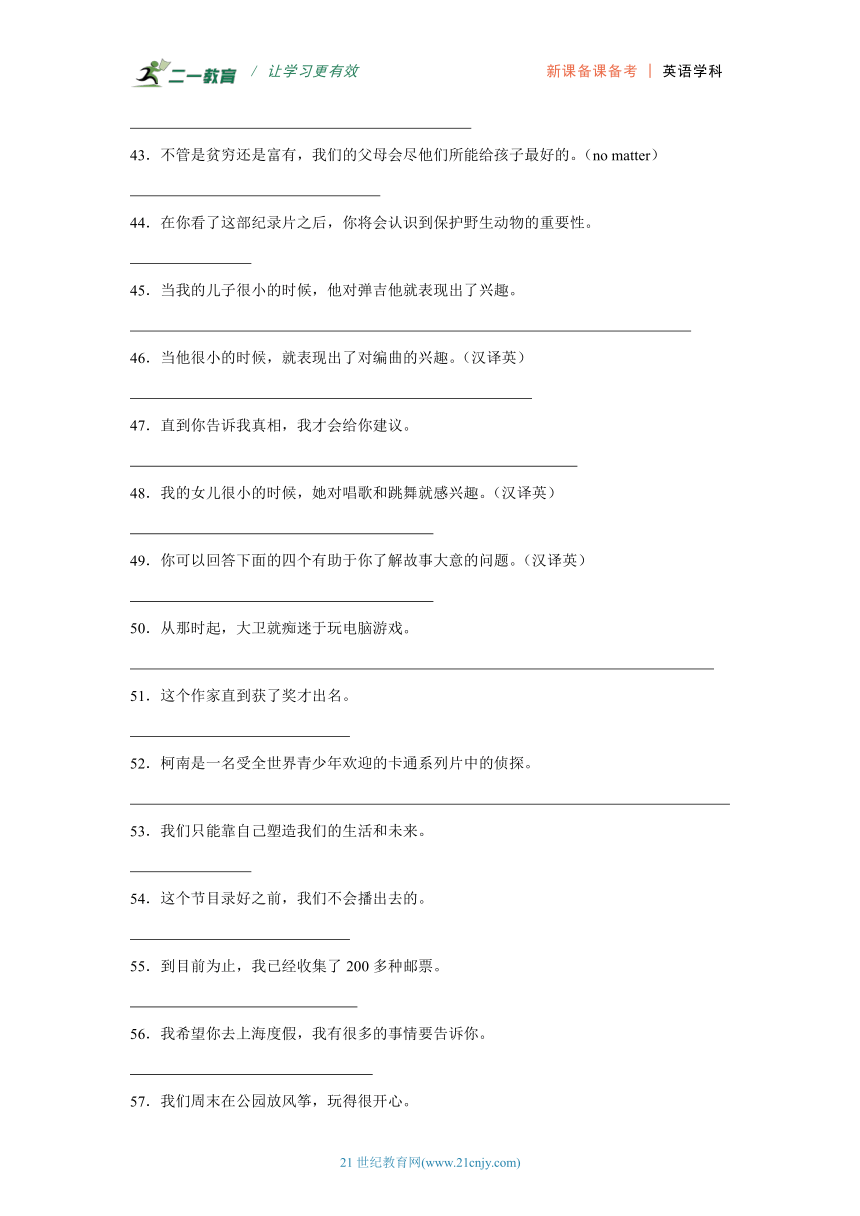
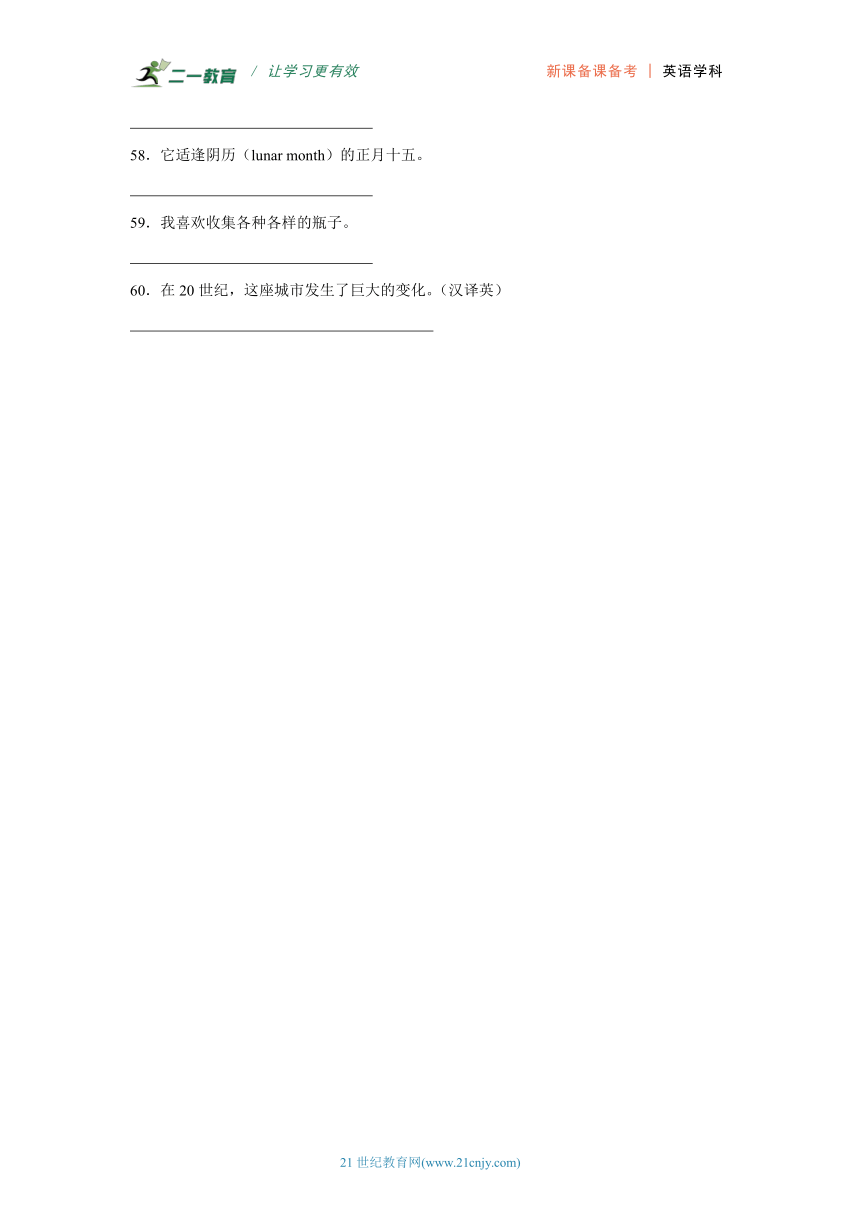
文档简介
/ 让学习更有效 新课备课备考 | 英语学科
/ 让学习更有效 新课备课备考 | 英语学科
2025-2026学年九年级英语上册单元复习考点培优外研版
Module 2 Public holidays
专题05 翻译题
学校:___________姓名:___________班级:___________考号:___________
1.当她到家时,她意识到她把书包忘在学校了。
2.她一到这儿就迫不及待地炫耀起她的新手表。
3.当他们嘲笑她的时候,我后悔什么也没说。(regret doing)
4.他们周六下午在公园打篮球非常开心。
5.你知道怎么种茶树并且怎么用它们制成茶吗?
6.彼得找到了一个合适的地方,挖了一个洞,把树种了。
7.昨天在我妈妈回家之前我就已经写完作业了。
8.当你第一次见到日本人的时候,你应该鞠躬。
9.贝蒂总是在假期一开始就去看望她的祖父母。
10.从地震发生到现在,他一直在给人们提供帮助。
11.我爸爸一得到消息就会给我打电话的。
12.学生们做了简短的致辞,并感谢了他们的老师。(give thanks)
13.一到夜晚12点,孩子们就会大喊“新年快乐”。(as soon as)
.
14.我的老师们直到完成了这项工作才回家。
15.李先生已经离开铁岭两个多月了。
16.我们一到那儿就开始工作了。
17.当你遇到困难的时候,尽量微笑面对人生。
18.地震发生时,孩子们正在花园里相互追逐。
19.你能记住当暴风雨来临时你在做什么吗?
20.无论走到哪里,祖国一声召唤他即刻返回。
21.闹钟一响我就得起床。(as soon as)
22.三十年来,中国在太空领域取得巨大的进展。
23.昨天下大雪的时候,那三个德国人在干什么
24.当我到达时,比赛已进行了半个小时。
25.老舍是20世纪中国最著名的作家之一。
26.直到失去健康你才会意识到它的重要性。
27.假期一开始,我们就去某个有趣的地方。
28.自从那时起,汤姆的叔叔离开家乡已有10多年了。
29.直到故事的最后你才会发现它很精彩。
30.当我关门时,我才意识到我把钥匙落在了家里。
31.当你第一次见到某个人的时候你应该握手。(汉译英)
32.直到电影结尾你才会解开谜团。
33.她小时候就对太空旅行感兴趣。(space travel)
34.你的老师们中谁对你最友善?(among)
35.当别人背后说你的坏话时,你感受如何?(say bad things about)
36.我父母总是鼓励我有问题时向老师求助。(汉译英)
37.从上个月一起吃饭后我就没见过她。(since)
38.当这个男孩做决定有困难时,他总是会向他的老师们寻求建议。
39.当遇到危险时,我们最好保持平静。
40.直到成功地做出了决定,我才感到放松。
41.当你犹豫不决的时候,红色可以有助于你做决定。
42.当青少年有问题时,他们不知道和谁说,如何解决问题。
43.不管是贫穷还是富有,我们的父母会尽他们所能给孩子最好的。(no matter)
44.在你看了这部纪录片之后,你将会认识到保护野生动物的重要性。
45.当我的儿子很小的时候,他对弹吉他就表现出了兴趣。
46.当他很小的时候,就表现出了对编曲的兴趣。(汉译英)
47.直到你告诉我真相,我才会给你建议。
48.我的女儿很小的时候,她对唱歌和跳舞就感兴趣。(汉译英)
49.你可以回答下面的四个有助于你了解故事大意的问题。(汉译英)
50.从那时起,大卫就痴迷于玩电脑游戏。
51.这个作家直到获了奖才出名。
52.柯南是一名受全世界青少年欢迎的卡通系列片中的侦探。
53.我们只能靠自己塑造我们的生活和未来。
54.这个节目录好之前,我们不会播出去的。
55.到目前为止,我已经收集了200多种邮票。
56.我希望你去上海度假,我有很多的事情要告诉你。
57.我们周末在公园放风筝,玩得很开心。
58.它适逢阴历(lunar month)的正月十五。
59.我喜欢收集各种各样的瓶子。
60.在20世纪,这座城市发生了巨大的变化。(汉译英)
/ 让学习更有效 新课备课备考 | 英语学科
/ 让学习更有效 新课备课备考 | 英语学科
21世纪教育网(www.21cnjy.com)
21世纪教育网(www.21cnjy.com)
参考答案及试题解析
1.When she got home, she realized that she had left her schoolbag at school.
【解析】根据题意可知,when“当……时候”,引导时间状语从句;she“她”,从句主语;get home“到家”,时态为一般过去时,此处应用动词的过去式形式got;she“她”,主句主语;realize“意识到”,时态为一般过去时,此处应用动词的过去式形式realized;that引导宾语从句;she“她”,主句主语;leave“遗忘”,此处表示到家时已完成这一动作,应用过去的过去,即过去完成时had left;her schoolbag“她的书包”;at school“在学校”。故填When she got home, she realized that she had left her schoolbag at school.
2.She couldn’t wait to show off her new watch as soon as she arrived here.
【解析】一……就……:as soon as,引导时间状语从句;到达:arrive;迫不及待做某事:can’t wait to do sth.;炫耀:show off;这儿:here。本句时态用一般过去时,arrive须为arrived,can’t须为couldn’t。故填She couldn’t wait to show off her new watch as soon as she arrived here.
3.When they laughed at her, I regretted saying nothing.
【解析】根据题干可知,此处是由when引导的时间状语从句,描述的动作已经发生,时态应用一般过去时。从句:When they laughed at her“当他们嘲笑她的时候”;主句:I regretted saying nothing“我后悔什么也没说”。故填When they laughed at her, I regretted saying nothing.
4.They had fun/had a good time playing basketball in the park on Saturday afternoon.
【解析】他们They;打篮球play basketball;做某事非常开心have fun/have a good time doing;在公园in the park;周六下午on Saturday afternoon。根据语境可知,该句为一般过去时,谓语动词用过去式,have过去式为had。故答案为They had fun/had a good time playing basketball in the park on Saturday afternoon.
5.Do you know how to grow tea trees and how to make tea from them
【解析】do you know“你知道吗”,构成一般疑问句;how to do“如何做”;grow tea trees“种茶树”;and“并且”;make tea from them“用它们制成茶”。故填Do you know how to grow tea trees and how to make tea from them
6.Peter found a suitable place, dug a hole and planted the tree.
【解析】根据语境可知,句子用一般过去时;发现:find;一个合适的地方:a suitable place;挖一个洞:dig a hole;种树:plant the tree;这三个动作是并列动作,用and连接,动词都为过去式。故填Peter found a suitable place, dug a hole and planted the tree.
7.Before/By the time my mother came back home yesterday, I had already finished my homework.
【解析】before“在……之前”;by the time“到……的时候”;my mother“我的妈妈”;come back home“回家”;yesterday“昨天”;already“已经”;finish“完成”;my homework“我的作业”。该句为before/by the time引导的时间状语从句,主句用过去完成时,结构为“had+done”,从句用一般过去时。故填Before/By the time my mother came back home yesterday, I had already finished my homework.
8.You are supposed to bow when you meet Japanese for the first time.
【解析】根据题干可知,句子应是含有when引导的时间状语从句的主从复合句,结合语境,句子用一般现在时。你:you,作主语;应该鞠躬:be supposed to bow,主语是you,此时be动词应用are;当你第一次见到日本人时:when you meet Japanese for the first time,for the first time是时间状语,位于从句的句末。故填You are supposed to bow when you meet Japanese for the first time.
9.Betty always goes to visit her grandparents as soon as the holiday begins.
【解析】根据汉语可知,本句是一般现在时,主语是Betty“贝蒂”,谓语动词用三单形式;“总是”always;“去看望”go to visit;“她的祖父母”her grandparents ;“在假期一开始”as soon as the holiday begins。故填Betty always goes to visit her grandparents as soon as the holiday begins.
10.He has been providing help to people since the earthquake occurred.
【解析】he“他”;根据句意可知,表示过去的动作一直延续到现在,并且还要延续下去,可以使用现在完成进行时:have been doing,主语是单数,助动词用has;provide“提供”;help“帮助”;people “人们”;since“自从”,引导时间状语从句,句子应用一般过去时;earthquake“地震”;occur“发生”。故填He has been providing help to people since the earthquake occurred.
11.My dad will call me as soon as he gets the news.
【解析】分析句子结构可知,my dad“我爸爸”作主语;给我打电话call me;一……就……as soon as,是固定短语,引导时间状语从句;得到消息get the news。主句是一般将来时,时间状语从句用一般现在时,主语是第三人称单数,谓语动词用第三人称单数形式。故填My dad will call me as soon as he gets the news.
12.The students made short speeches and gave thanks to their teachers.
【解析】根据句意可知,时态是一般过去时;学生们the students,做了简短的致辞made short speeches,并and,感谢了他们的老师gave thanks to their teachers。故填The students made short speeches and gave thanks to their teachers.
13.As soon as it was 12 p.m., children all shouted “Happy New Year” very loudly.
【解析】由汉意可知,时态应用一般过去时;一……就……:as soon as,引导时间状语从句,从句主语为it,指代时间,be动词用was;晚上12点:12 p.m.;孩子们:children,作主句主语;喊叫:shouted,为主句谓语;新年快乐:Happy New Year;大声地:loudly,副词修饰动词。故填As soon as it was 12 p.m., children all shouted “Happy New Year” very loudly.
14.My teachers didn’t go home until they finished the work.
【解析】根据题干可知,时态为一般过去时。我的老师们:my teachers;直到……才:not... until;完成:finish;这项工作:the work;回家:go home。否定形式需借助助动词did,后跟动词原形;从句动词需用过去式finished。故填My teachers didn’t go home until they finished the work.
15.Mr. Li has been away from Tieling for over two months.
【解析】李先生:Mr. Li;离开……:be away from;两个多月:over two months。句子是含有“for+一段时间”的现在完成时,用延续性动词。故填Mr. Li has been away from Tieling for over two months.
16.We began to work as soon as we got there.
【解析】“我们”we,作主语;“一……就”as soon as,引导时间状语从句;“到那儿”get there;“开始工作”begin to work。根据汉语意思可知用一般过去时。故填We began to work as soon as we got there.
17.When you are in trouble, try to smile at (your) life.
【解析】当……的时候:when;你:you;遇到困难:be in trouble,主语是you,所以be动词用are;尽量做某事:try to do sth;笑对人生:smile at (your) life。故填When you are in trouble, try to smile at (your) life.
18.The children were running after each other in the garden when the earthquake happened.
【解析】根据题干,句子可用when引导的时间状语从句,从句时态为一般过去时,主句时态为过去进行时;主句主语:the children,句首字母需大写;正在相互追逐:were running after each other;在花园里:in the garden;引导词:when;从句主语:the earthquake;从句谓语:happened。故填The children were running after each other in the garden when the earthquake happened.
19.Can/Do you remember what you were doing when the rainstorm came
【解析】记得remember;什么what;你正在做什么you were doing,时态用过去进行时;当暴风雨来临时when the rainstorm came,时态用一般过去时。本句为含有宾语从句和状语从句的一般疑问句,用can/do引导一般疑问句。故填Can/Do you remember what you were doing when the rainstorm came
20.Wherever he goes, he will return to motherland as soon as he is needed.
【解析】无论哪里:wherever;走到:go;祖国:motherland;返回:return to;一召唤就……: as soon as he is needed。主语he是单数,go用goes;as soon as“一 ……就……”,此处指未发生的动作,用“主将从现”,故填Wherever he goes, he will return to motherland as soon as he is needed.
21.I have to get up as soon as the alarm clock goes off.
【解析】结合题干可知,句子为含有as soon as引导的时间状语从句的复合句。我:I;就得:have to,为情态动词词组;起床:get up;闹钟:the alarm clock;响:go off。主句是含有情态动词的一般现在时,此时从句也应用一般现在时,主句的主语是I,情态动词用have to,位于have to后的动词get用原形;从句的主语是the alarm clock,动词goes用三单形式。故填I have to get up as soon as the alarm clock goes off.
22.In/Over the past thirty years, China has made great progress in space.
【解析】三十年来:in/over the past thirty years;取得巨大的进展:make great progress;在太空领域:in space。结合语境可知,此处应用现在完成时,主语China是单数,助动词用has。故填In/Over the past thirty years, China has made great progress in space.
23.What were the three Germans doing when it snowed heavily yesterday
【解析】what什么;the three Germans那三个德国人;do做;when当……时候;snow heavily下大雪;yesterday昨天。根据句意可知句子是when引导的时间状语从句,根据句意可知主句用过去进行时,其构成是was/were+现在分词,主语the three Germans是复数,be动词用were,do的现在分词是doing;从句用一般过去时,snow的过去式是snowed,句首字母需大写。故填What were the three Germans doing when it snowed heavily yesterday
24.When I arrived, the match had been on for half an hour.
【解析】分析题干可知,从句是“当我到达时”,连词“当”when,主语是“我”I,谓语动词“到达”arrive,从句是一般过去时,所以arrive用过去式arrived,所以从句翻译成When I arrived;主句是“比赛已进行了半个小时”,主语是“比赛”the match,时间状语是“半个小时”for half an hour,由时间状语可知谓语动词“进行”用延续性动词短语be on,且主句是过去完成时,即had+过去分词,表示从过去某一时间开始,持续到过去另一时间的动作或状态。be的过去分词是been,所以谓语动词短语是had been on,所以主句翻译成the match had been on for half an hour。故填When I arrived, the match had been on for half an hour.
25.Lao She was one of the most famous writers in the twentieth century in China./Lao She was one of the most famous Chinese writers in the twentieth century.
【解析】根据汉意判断时态为一般过去时;老舍“Lao She”,作主语;是“be”,此处用was;最……之一“one of+the+最高级+名词复数”;最著名的“most famous”,形容词最高级;作家“writer”,此处用复数writers;20世纪“in the twentieth century”,作时间状语;中国“in China”,作地点状语,也可用形容词Chinese放在名词writers前。故填Lao She was one of the most famous writers in the twentieth century in China./Lao She was one of the most famous Chinese writers in the twentieth century.
26.You won’t realize the importance of health until you lose it.
【解析】你:you;直到……才……:not...until...;失去: lose;意识到:realize;……的重要性: the importance of …。由句意可知时态是一般将来时,用will+动词原形。故填You won’t realize the importance of health until you lose it.
27.We will go somewhere interesting as soon as the holiday begins.
【解析】as soon as“一……就……”,引导时间状语从句,遵循“主将从现”,go somewhere interesting“去某个有趣的地方”,holiday“假期”,begin“开始”,从句主语是单数形式,动词用三单,故填We will go somewhere interesting as soon as the holiday begins.
28.Since then, Tom’s uncle has been away from his hometown for more than ten years.
【解析】“自从那时起”since then,句子要用现在完成时,“汤姆的叔叔”Tom’s uncle,“离开家乡”leave his hometown,此处动词应用延续性动词,变成has been away from his hometown,“已有10多年了”for more than ten years,故填Since then, Tom’s uncle has been away from his hometown for more than ten years.
29.You will/can not find it very wonderful until the end of the story.
【解析】直到:until;直到……才……:not...until...;故事的最后:the end of the story;发现:find;精彩:wonderful。结合语境可知,此题为一般将来时will do或者使用情态动词can。故填You will/can not find it very wonderful until the end of the story.
30.When I closed the door, I realized that I had left my keys at home.
【解析】when“当……时”;close the door“关门”;realize“意识到”,后接that引导的宾语从句;leave my keys at home“把钥匙落在家里”。描述过去发生的事情,用一般过去时,that引导的从句表示过去的过去,用过去完成时,故填When I closed the door, I realized that I had left my keys at home.
31.You should shake hands when you see someone for the first time.
【解析】分析所给中文可知,此句是when引导的时间状语从句。主句:你:You,句子首字母大写;应该:should;握手:shake hands,情态动词后用动词原形;从句:当:when;第一次:for the first time;见到:see;某个人:someone。故填You should shake hands when you see someone for the first time.
32.You won’t solve the mysteries until the very end of the film.
【解析】not…until…表示“直到……才……”,the very end of“……的结尾”,the film“这部电影”,you“你”,solve“解决”,the mysteries“谜团”,此处用一般将来时will do sth,故填You won’t solve the mysteries until the very end of the film.
33.She was interested in space travel when she was young./She had/took an interest/showed (an) interest in space travel when she was young.
【解析】结合语境可知,此题为一般过去时。“她小时候”就是“当她小的时候”,即“when she was young”,when引导时间状语从句。对……感兴趣:be interested in/have an interest in/take an interest in/show (an) interest in,主语she为第三人称单数,be动词用was,动词have/take/show的过去式分别为had/took/showed;太空旅行:space travel。故填She was interested in space travel when she was young./She had/took an interest/showed (an) interest in space travel when she was young.
34.Who among your teachers is the kindest to you?
【解析】who“谁”,特殊疑问句放在句首,且首字母要大写;among your teachers“老师们中”;be kind to sb“对某人友善”;三者以上的比较要用最高级,且形容词最高级前用冠词the;此句是一般现在时,故填Who among your teachers is the kindest to you?
35.How do you feel when others say bad things about you behind your back
【解析】“如何”how;“你”you;“感觉”feel;“当……时候”when,引导时间状语从句;“别人”others;“说你的坏话”say bad things about you;“在你的背后”behind your back。结合语境可知,此句应用一般现在时,主句主语“you”是第二人称,故助动词应用do;从句主语“others”是复数形式,故动词应用原形。故填How do you feel when others say bad things about you behind your back
36.My parents always encourage me to ask the teacher for help when I have problems.
【解析】“鼓励某人去做某事”encourage sb to do sth;“向某人寻求帮助”ask sb for help;主语“我父母”my parents;“总是”always;“老师”the teacher;“当……时候”when;“我”I ;“有”have;“问题”problems;句子是一般情况,同时根据频率副词“总是”提示可知,本句需用一般现在时。故填My parents always encourage me to ask the teacher for help when I have problems.
37.I have not met her since we had dinner together last month.
【解析】根据汉语意思可知此句应译为“since”引导的时间状语从句,“since”引导的从句“从上个月一起吃饭后”应用一般过去时,主句“我就没见过她”应用现在完成时。主句主语“我”译为“I”;谓语部分“没见过”译为“have not met”;宾语“她”译为“her”,因此主句译为“I have not met her”。从句主语“我们”译为“we”;谓语动词“吃”译为“had”;宾语“饭”译为“dinner”,“一起”译为“together”,时间状语“上个月”译为“last month”,因此从句译为“since we had dinner together last month”。故填I have not met her since we had dinner together last month.
38.When the boy has difficulty making decisions, he always asks his teachers for advice.
【解析】when“当……时”,have difficulty doing sth“做某事有困难”;make decisions“做决定”;ask sb for sth“向某人寻求”;advice“建议”,不可数名词;teacher“老师”,此句用其复数形式;此句是一般现在时,主语是单数形式,动词用三单,故填When the boy has difficulty making decisions, he always asks his teachers for advice.
39.When in danger, we’d better keep calm.
【解析】当……时:when;遇到危险:in danger;我们:we;最好:had better;保持平静:keep calm。本句应用一般现在时,且含有when引导的时间状语从句,从句中省略了主语we和be动词are,因此从句为when in danger,位于句首,首字母w要大写;had better缩略为’d better,后接动词原形。故填When in danger, we’d better keep calm.
40.I didn’t feel relaxed until I had successfully made a decision.
【解析】not...until“直到……才”,successfully“成功地”,make a decision“做决定”,I“我”,feel relaxed“感到放松”。根据句意可知,“成功地做出了决定”发生在“感到放松”之前,用过去完成时和一般过去时。故填I didn’t feel relaxed until I had successfully made a decision.
41.Red may help when you have difficulty making a decision.
【解析】当……的时候:when,引导时间状语从句;你犹豫不决you have difficulty making a decision,红色可以有助于red may help,may是情态动词,后接动词原形,故填Red may help when you have difficulty making a decision.
42.When teenagers have problems, they don’t know who to talk to and how to deal with them.
【解析】when“当……时候”;teenagers“青少年”;have problems“有问题”;they“他们”;don’t know“不知道”;who to talk to“和谁说”,疑问词+不定式作宾语;how“如何”,to deal with them“解决问题”,与who to talk to一起作know的宾语。故填When teenagers have problems, they don’t know who to talk to and how to deal with them.
43.No matter (we are) poor or rich, our parents will try (their best) to give their kids/children best.
【解析】no matter“不管”,poor“贫穷的”,rich“富有的”,our parents“我们的父母”,try one’s best to do sth=try to do sth“尽所能做某事”,give sb sth“给某人某物”,kids=children“孩子”,结合句意,我们的父母将给孩子最好的,此处用一般将来时,故填No matter (we are) poor or rich, our parents will try (their best) to give their kids/children best.
44.After you watch the documentary, you’ll realize the importance of protecting wild animals.
【解析】根据中文句意可知,After “之后”;you“你”;watch the documentary“看这部纪录片”;realize “认识到”;the importance of “……的重要性”;protect wild animals“保护野生动物”。本句为after引导的时间状语从句,遵循“主将从现”,从句使用动词原形,主句结构为:will+动词原形,介词of后跟动名词。故填After you watch the documentary, you’ll realize the importance of protecting wild animals.
45.When my son was very young, he showed an interest in playing the guitar.
【解析】这是“when”引导的时间状语从句,句子是一般过去时。从句的主语是“我的儿子”,翻译为“my son”,be动词用“was”,表达“很”,用副词“very”,表达“小”,用形容词“young”。主句的主语是“he”,表达“对某事表现出兴趣”用短语“show an interest in sth./doing”。动词用过去式“showed”。表达“弹吉他”用动词短语“playing the guitar”。故填When my son was very young, he showed an interest in playing the guitar.
46.He showed an interest in making up music when he was very young.
【解析】“当……时候”为when,引导时间状语从句;“他”为he,代词主格作主语;“很小”为very young,形容词作表语;“对做某事表现出兴趣”为show an interest in doing sth.;“编曲”为make up music。结合语境可知,此题为一般过去时,主句谓语应变过去式showed,主语he为第三人称单数,从句be动词应用was。故填He showed an interest in making up music when he was very young.
47.I won’t give you any advice until you tell me the truth.
【解析】not...until“直到……才……”,遵循“主将从现”;I“我”;give you“给你”;any advice“任何建议”;tell me the truth“告诉我真相”。故填I won’t give you any advice until you tell me the truth.
48.When my daughter was very young, she showed an interest in singing and dancing.
【解析】我的女儿:my daughter ;很小:be very young;她:she;对……感兴趣:show an interest in;唱歌和跳舞:singing and dancing。根据语境可知,本句是含有when引导的时间状语从句,表示“当……时候”,句子时态用一般过去时,从句是“主系表”的结构,主语my daughter是单数,谓语用was;主句中,谓语动词show用过去式showed。故填When my daughter was very young, she showed an interest in singing and dancing.
49.You can answer the following four questions that help you get the general idea of the story.
【解析】“你”you;“可以”can,后接动词原形;“回答下面的四个问题”answer the following four questions;“the following four questions”是先行词,后接that引导的定语从句;“帮某人做某事”help sb. do sth.;“了解故事大意”get the general idea of the story。故填You can answer the following four questions that help you get the general idea of the story.
50.Since then, David has been crazy about playing computer games.
【解析】since then“从那时起”是现在完成时的标志词,be crazy about doing sth“痴迷于做某事”,play computer games“玩电脑游戏”,故填Since then, David has been crazy about playing computer games.
51.The writer didn’t become famous until he won the award.
【解析】根据中文句意可知,The writer“这个作家”;not…until“直到……才”;become famous“变得出名”;win the award“获奖”。本句为一般过去时,主从句均使用动词过去式。故填The writer didn’t become famous until he won the award.
52.Conan is a detective who appears in a cartoon series popular among teenagers all over the world.
【解析】根据汉语意思可知,句子是who引导的定语从句,a detective“一名侦探”是第三人称单数,appear“出现”用第三人称单数appears,in a cartoon series“在卡通系列中”,popular“受欢迎的”,among teenagers“青少年之间”,all over the world“全世界”,故填Conan is a detective who appears in a cartoon series popular among teenagers all over the world.
53.We can only depend on ourselves to shape our life and future.
【解析】“我们”we;“能”can,后跟动词原形;“只” only;“靠某人做某事” depend on sb to do sth,主语是we,所以用ourselves表示“自己”;“塑造”shape;“我们的生活和未来”our life and future。故填We can only depend on ourselves to shape our life and future.
54.We won’t send out the program until/before it is recorded.
【解析】根据中文句意可知,send out the program“播出这个节目”;not…until“直到……才”;before“在……之前”;record“录制”。本句为until或者before引导的时间状语从句,时态使用主将从现,从句为一般现在时的被动语态,指节目被录制。故填We won’t send out the program until/before it is recorded.
55.So far, I have collected over 200 kinds of stamps.
【解析】到目前为止:so far;收集:collect;200多种邮票:over 200 kinds of stamps。本句时间状语为“so far”,故时态为现在完成时。故填So far, I have collected over 200 kinds of stamps.
56.I hope you will take a vacation to Shanghai and I have a lot to tell you.
【解析】我:I;希望:hope;你:you;去上海度假:take a vacation to Shanghai;有很多的事情:have a lot;告诉你:tell you。结合语境可知,“我希望……”和“我有……”是并列句,用一般现在时;“你去上海度假”是宾语从句,用一般将来时:will加动词原形。“要告诉你”作定语修饰“很多事情”,用动词不定式表将来,即to tell you。故填I hope you will take a vacation to Shanghai and I have a lot to tell you.
57.We flew kites in the park at weekends and had great fun.
【解析】句子是陈述句。主语是“we”,表达“放风筝”,用短语“fly kites”。句子是一般过去时,动词用过去式“flew”。表达“在公园”用短语“in the park”作地点状语。表达“周末”用短语“at weekends”作时间状语。表达“玩得很开心”用短语“had great fun”。用连词“and”连接两个动词形成并列结构。故填We flew kites in the park at weekends and had great fun.
58.It falls on the fifteenth day of the first lunar month.
【解析】它:It,作主语;适逢:fall on,动词短语;阴历的正月十五:the fifteenth day of the first lunar month。根据语境可知,此句陈述的是客观事实,故用一般现在时态,主语为第三人称单数,谓语动词用三单形式。故填It falls on the fifteenth day of the first lunar month.
59.I like collecting all kinds of bottles.
【解析】我:I;喜欢:like;收集:collect;各种各样的:all kinds of ;瓶子:bottle。结合语境可知,此题为一般现在时,主语I,谓语动词用原形like,喜欢做某事用like doing,all kinds of后面接可数名词复数形式。故填I like collecting all kinds of bottles.
60.Great changes took place in this city in the twentieth/20th century.
【解析】在20世纪:in the twentieth/20th century,句子使用一般过去时,主语是Great changes“巨大的变化”;谓语用动词过去式took place“发生”,在这座城市:in this city,地点状语放谓语之后。故填Great changes took place in this city in the twentieth/20th century.
21世纪教育网(www.21cnjy.com)
21世纪教育网(www.21cnjy.com)
/ 让学习更有效 新课备课备考 | 英语学科
2025-2026学年九年级英语上册单元复习考点培优外研版
Module 2 Public holidays
专题05 翻译题
学校:___________姓名:___________班级:___________考号:___________
1.当她到家时,她意识到她把书包忘在学校了。
2.她一到这儿就迫不及待地炫耀起她的新手表。
3.当他们嘲笑她的时候,我后悔什么也没说。(regret doing)
4.他们周六下午在公园打篮球非常开心。
5.你知道怎么种茶树并且怎么用它们制成茶吗?
6.彼得找到了一个合适的地方,挖了一个洞,把树种了。
7.昨天在我妈妈回家之前我就已经写完作业了。
8.当你第一次见到日本人的时候,你应该鞠躬。
9.贝蒂总是在假期一开始就去看望她的祖父母。
10.从地震发生到现在,他一直在给人们提供帮助。
11.我爸爸一得到消息就会给我打电话的。
12.学生们做了简短的致辞,并感谢了他们的老师。(give thanks)
13.一到夜晚12点,孩子们就会大喊“新年快乐”。(as soon as)
.
14.我的老师们直到完成了这项工作才回家。
15.李先生已经离开铁岭两个多月了。
16.我们一到那儿就开始工作了。
17.当你遇到困难的时候,尽量微笑面对人生。
18.地震发生时,孩子们正在花园里相互追逐。
19.你能记住当暴风雨来临时你在做什么吗?
20.无论走到哪里,祖国一声召唤他即刻返回。
21.闹钟一响我就得起床。(as soon as)
22.三十年来,中国在太空领域取得巨大的进展。
23.昨天下大雪的时候,那三个德国人在干什么
24.当我到达时,比赛已进行了半个小时。
25.老舍是20世纪中国最著名的作家之一。
26.直到失去健康你才会意识到它的重要性。
27.假期一开始,我们就去某个有趣的地方。
28.自从那时起,汤姆的叔叔离开家乡已有10多年了。
29.直到故事的最后你才会发现它很精彩。
30.当我关门时,我才意识到我把钥匙落在了家里。
31.当你第一次见到某个人的时候你应该握手。(汉译英)
32.直到电影结尾你才会解开谜团。
33.她小时候就对太空旅行感兴趣。(space travel)
34.你的老师们中谁对你最友善?(among)
35.当别人背后说你的坏话时,你感受如何?(say bad things about)
36.我父母总是鼓励我有问题时向老师求助。(汉译英)
37.从上个月一起吃饭后我就没见过她。(since)
38.当这个男孩做决定有困难时,他总是会向他的老师们寻求建议。
39.当遇到危险时,我们最好保持平静。
40.直到成功地做出了决定,我才感到放松。
41.当你犹豫不决的时候,红色可以有助于你做决定。
42.当青少年有问题时,他们不知道和谁说,如何解决问题。
43.不管是贫穷还是富有,我们的父母会尽他们所能给孩子最好的。(no matter)
44.在你看了这部纪录片之后,你将会认识到保护野生动物的重要性。
45.当我的儿子很小的时候,他对弹吉他就表现出了兴趣。
46.当他很小的时候,就表现出了对编曲的兴趣。(汉译英)
47.直到你告诉我真相,我才会给你建议。
48.我的女儿很小的时候,她对唱歌和跳舞就感兴趣。(汉译英)
49.你可以回答下面的四个有助于你了解故事大意的问题。(汉译英)
50.从那时起,大卫就痴迷于玩电脑游戏。
51.这个作家直到获了奖才出名。
52.柯南是一名受全世界青少年欢迎的卡通系列片中的侦探。
53.我们只能靠自己塑造我们的生活和未来。
54.这个节目录好之前,我们不会播出去的。
55.到目前为止,我已经收集了200多种邮票。
56.我希望你去上海度假,我有很多的事情要告诉你。
57.我们周末在公园放风筝,玩得很开心。
58.它适逢阴历(lunar month)的正月十五。
59.我喜欢收集各种各样的瓶子。
60.在20世纪,这座城市发生了巨大的变化。(汉译英)
/ 让学习更有效 新课备课备考 | 英语学科
/ 让学习更有效 新课备课备考 | 英语学科
21世纪教育网(www.21cnjy.com)
21世纪教育网(www.21cnjy.com)
参考答案及试题解析
1.When she got home, she realized that she had left her schoolbag at school.
【解析】根据题意可知,when“当……时候”,引导时间状语从句;she“她”,从句主语;get home“到家”,时态为一般过去时,此处应用动词的过去式形式got;she“她”,主句主语;realize“意识到”,时态为一般过去时,此处应用动词的过去式形式realized;that引导宾语从句;she“她”,主句主语;leave“遗忘”,此处表示到家时已完成这一动作,应用过去的过去,即过去完成时had left;her schoolbag“她的书包”;at school“在学校”。故填When she got home, she realized that she had left her schoolbag at school.
2.She couldn’t wait to show off her new watch as soon as she arrived here.
【解析】一……就……:as soon as,引导时间状语从句;到达:arrive;迫不及待做某事:can’t wait to do sth.;炫耀:show off;这儿:here。本句时态用一般过去时,arrive须为arrived,can’t须为couldn’t。故填She couldn’t wait to show off her new watch as soon as she arrived here.
3.When they laughed at her, I regretted saying nothing.
【解析】根据题干可知,此处是由when引导的时间状语从句,描述的动作已经发生,时态应用一般过去时。从句:When they laughed at her“当他们嘲笑她的时候”;主句:I regretted saying nothing“我后悔什么也没说”。故填When they laughed at her, I regretted saying nothing.
4.They had fun/had a good time playing basketball in the park on Saturday afternoon.
【解析】他们They;打篮球play basketball;做某事非常开心have fun/have a good time doing;在公园in the park;周六下午on Saturday afternoon。根据语境可知,该句为一般过去时,谓语动词用过去式,have过去式为had。故答案为They had fun/had a good time playing basketball in the park on Saturday afternoon.
5.Do you know how to grow tea trees and how to make tea from them
【解析】do you know“你知道吗”,构成一般疑问句;how to do“如何做”;grow tea trees“种茶树”;and“并且”;make tea from them“用它们制成茶”。故填Do you know how to grow tea trees and how to make tea from them
6.Peter found a suitable place, dug a hole and planted the tree.
【解析】根据语境可知,句子用一般过去时;发现:find;一个合适的地方:a suitable place;挖一个洞:dig a hole;种树:plant the tree;这三个动作是并列动作,用and连接,动词都为过去式。故填Peter found a suitable place, dug a hole and planted the tree.
7.Before/By the time my mother came back home yesterday, I had already finished my homework.
【解析】before“在……之前”;by the time“到……的时候”;my mother“我的妈妈”;come back home“回家”;yesterday“昨天”;already“已经”;finish“完成”;my homework“我的作业”。该句为before/by the time引导的时间状语从句,主句用过去完成时,结构为“had+done”,从句用一般过去时。故填Before/By the time my mother came back home yesterday, I had already finished my homework.
8.You are supposed to bow when you meet Japanese for the first time.
【解析】根据题干可知,句子应是含有when引导的时间状语从句的主从复合句,结合语境,句子用一般现在时。你:you,作主语;应该鞠躬:be supposed to bow,主语是you,此时be动词应用are;当你第一次见到日本人时:when you meet Japanese for the first time,for the first time是时间状语,位于从句的句末。故填You are supposed to bow when you meet Japanese for the first time.
9.Betty always goes to visit her grandparents as soon as the holiday begins.
【解析】根据汉语可知,本句是一般现在时,主语是Betty“贝蒂”,谓语动词用三单形式;“总是”always;“去看望”go to visit;“她的祖父母”her grandparents ;“在假期一开始”as soon as the holiday begins。故填Betty always goes to visit her grandparents as soon as the holiday begins.
10.He has been providing help to people since the earthquake occurred.
【解析】he“他”;根据句意可知,表示过去的动作一直延续到现在,并且还要延续下去,可以使用现在完成进行时:have been doing,主语是单数,助动词用has;provide“提供”;help“帮助”;people “人们”;since“自从”,引导时间状语从句,句子应用一般过去时;earthquake“地震”;occur“发生”。故填He has been providing help to people since the earthquake occurred.
11.My dad will call me as soon as he gets the news.
【解析】分析句子结构可知,my dad“我爸爸”作主语;给我打电话call me;一……就……as soon as,是固定短语,引导时间状语从句;得到消息get the news。主句是一般将来时,时间状语从句用一般现在时,主语是第三人称单数,谓语动词用第三人称单数形式。故填My dad will call me as soon as he gets the news.
12.The students made short speeches and gave thanks to their teachers.
【解析】根据句意可知,时态是一般过去时;学生们the students,做了简短的致辞made short speeches,并and,感谢了他们的老师gave thanks to their teachers。故填The students made short speeches and gave thanks to their teachers.
13.As soon as it was 12 p.m., children all shouted “Happy New Year” very loudly.
【解析】由汉意可知,时态应用一般过去时;一……就……:as soon as,引导时间状语从句,从句主语为it,指代时间,be动词用was;晚上12点:12 p.m.;孩子们:children,作主句主语;喊叫:shouted,为主句谓语;新年快乐:Happy New Year;大声地:loudly,副词修饰动词。故填As soon as it was 12 p.m., children all shouted “Happy New Year” very loudly.
14.My teachers didn’t go home until they finished the work.
【解析】根据题干可知,时态为一般过去时。我的老师们:my teachers;直到……才:not... until;完成:finish;这项工作:the work;回家:go home。否定形式需借助助动词did,后跟动词原形;从句动词需用过去式finished。故填My teachers didn’t go home until they finished the work.
15.Mr. Li has been away from Tieling for over two months.
【解析】李先生:Mr. Li;离开……:be away from;两个多月:over two months。句子是含有“for+一段时间”的现在完成时,用延续性动词。故填Mr. Li has been away from Tieling for over two months.
16.We began to work as soon as we got there.
【解析】“我们”we,作主语;“一……就”as soon as,引导时间状语从句;“到那儿”get there;“开始工作”begin to work。根据汉语意思可知用一般过去时。故填We began to work as soon as we got there.
17.When you are in trouble, try to smile at (your) life.
【解析】当……的时候:when;你:you;遇到困难:be in trouble,主语是you,所以be动词用are;尽量做某事:try to do sth;笑对人生:smile at (your) life。故填When you are in trouble, try to smile at (your) life.
18.The children were running after each other in the garden when the earthquake happened.
【解析】根据题干,句子可用when引导的时间状语从句,从句时态为一般过去时,主句时态为过去进行时;主句主语:the children,句首字母需大写;正在相互追逐:were running after each other;在花园里:in the garden;引导词:when;从句主语:the earthquake;从句谓语:happened。故填The children were running after each other in the garden when the earthquake happened.
19.Can/Do you remember what you were doing when the rainstorm came
【解析】记得remember;什么what;你正在做什么you were doing,时态用过去进行时;当暴风雨来临时when the rainstorm came,时态用一般过去时。本句为含有宾语从句和状语从句的一般疑问句,用can/do引导一般疑问句。故填Can/Do you remember what you were doing when the rainstorm came
20.Wherever he goes, he will return to motherland as soon as he is needed.
【解析】无论哪里:wherever;走到:go;祖国:motherland;返回:return to;一召唤就……: as soon as he is needed。主语he是单数,go用goes;as soon as“一 ……就……”,此处指未发生的动作,用“主将从现”,故填Wherever he goes, he will return to motherland as soon as he is needed.
21.I have to get up as soon as the alarm clock goes off.
【解析】结合题干可知,句子为含有as soon as引导的时间状语从句的复合句。我:I;就得:have to,为情态动词词组;起床:get up;闹钟:the alarm clock;响:go off。主句是含有情态动词的一般现在时,此时从句也应用一般现在时,主句的主语是I,情态动词用have to,位于have to后的动词get用原形;从句的主语是the alarm clock,动词goes用三单形式。故填I have to get up as soon as the alarm clock goes off.
22.In/Over the past thirty years, China has made great progress in space.
【解析】三十年来:in/over the past thirty years;取得巨大的进展:make great progress;在太空领域:in space。结合语境可知,此处应用现在完成时,主语China是单数,助动词用has。故填In/Over the past thirty years, China has made great progress in space.
23.What were the three Germans doing when it snowed heavily yesterday
【解析】what什么;the three Germans那三个德国人;do做;when当……时候;snow heavily下大雪;yesterday昨天。根据句意可知句子是when引导的时间状语从句,根据句意可知主句用过去进行时,其构成是was/were+现在分词,主语the three Germans是复数,be动词用were,do的现在分词是doing;从句用一般过去时,snow的过去式是snowed,句首字母需大写。故填What were the three Germans doing when it snowed heavily yesterday
24.When I arrived, the match had been on for half an hour.
【解析】分析题干可知,从句是“当我到达时”,连词“当”when,主语是“我”I,谓语动词“到达”arrive,从句是一般过去时,所以arrive用过去式arrived,所以从句翻译成When I arrived;主句是“比赛已进行了半个小时”,主语是“比赛”the match,时间状语是“半个小时”for half an hour,由时间状语可知谓语动词“进行”用延续性动词短语be on,且主句是过去完成时,即had+过去分词,表示从过去某一时间开始,持续到过去另一时间的动作或状态。be的过去分词是been,所以谓语动词短语是had been on,所以主句翻译成the match had been on for half an hour。故填When I arrived, the match had been on for half an hour.
25.Lao She was one of the most famous writers in the twentieth century in China./Lao She was one of the most famous Chinese writers in the twentieth century.
【解析】根据汉意判断时态为一般过去时;老舍“Lao She”,作主语;是“be”,此处用was;最……之一“one of+the+最高级+名词复数”;最著名的“most famous”,形容词最高级;作家“writer”,此处用复数writers;20世纪“in the twentieth century”,作时间状语;中国“in China”,作地点状语,也可用形容词Chinese放在名词writers前。故填Lao She was one of the most famous writers in the twentieth century in China./Lao She was one of the most famous Chinese writers in the twentieth century.
26.You won’t realize the importance of health until you lose it.
【解析】你:you;直到……才……:not...until...;失去: lose;意识到:realize;……的重要性: the importance of …。由句意可知时态是一般将来时,用will+动词原形。故填You won’t realize the importance of health until you lose it.
27.We will go somewhere interesting as soon as the holiday begins.
【解析】as soon as“一……就……”,引导时间状语从句,遵循“主将从现”,go somewhere interesting“去某个有趣的地方”,holiday“假期”,begin“开始”,从句主语是单数形式,动词用三单,故填We will go somewhere interesting as soon as the holiday begins.
28.Since then, Tom’s uncle has been away from his hometown for more than ten years.
【解析】“自从那时起”since then,句子要用现在完成时,“汤姆的叔叔”Tom’s uncle,“离开家乡”leave his hometown,此处动词应用延续性动词,变成has been away from his hometown,“已有10多年了”for more than ten years,故填Since then, Tom’s uncle has been away from his hometown for more than ten years.
29.You will/can not find it very wonderful until the end of the story.
【解析】直到:until;直到……才……:not...until...;故事的最后:the end of the story;发现:find;精彩:wonderful。结合语境可知,此题为一般将来时will do或者使用情态动词can。故填You will/can not find it very wonderful until the end of the story.
30.When I closed the door, I realized that I had left my keys at home.
【解析】when“当……时”;close the door“关门”;realize“意识到”,后接that引导的宾语从句;leave my keys at home“把钥匙落在家里”。描述过去发生的事情,用一般过去时,that引导的从句表示过去的过去,用过去完成时,故填When I closed the door, I realized that I had left my keys at home.
31.You should shake hands when you see someone for the first time.
【解析】分析所给中文可知,此句是when引导的时间状语从句。主句:你:You,句子首字母大写;应该:should;握手:shake hands,情态动词后用动词原形;从句:当:when;第一次:for the first time;见到:see;某个人:someone。故填You should shake hands when you see someone for the first time.
32.You won’t solve the mysteries until the very end of the film.
【解析】not…until…表示“直到……才……”,the very end of“……的结尾”,the film“这部电影”,you“你”,solve“解决”,the mysteries“谜团”,此处用一般将来时will do sth,故填You won’t solve the mysteries until the very end of the film.
33.She was interested in space travel when she was young./She had/took an interest/showed (an) interest in space travel when she was young.
【解析】结合语境可知,此题为一般过去时。“她小时候”就是“当她小的时候”,即“when she was young”,when引导时间状语从句。对……感兴趣:be interested in/have an interest in/take an interest in/show (an) interest in,主语she为第三人称单数,be动词用was,动词have/take/show的过去式分别为had/took/showed;太空旅行:space travel。故填She was interested in space travel when she was young./She had/took an interest/showed (an) interest in space travel when she was young.
34.Who among your teachers is the kindest to you?
【解析】who“谁”,特殊疑问句放在句首,且首字母要大写;among your teachers“老师们中”;be kind to sb“对某人友善”;三者以上的比较要用最高级,且形容词最高级前用冠词the;此句是一般现在时,故填Who among your teachers is the kindest to you?
35.How do you feel when others say bad things about you behind your back
【解析】“如何”how;“你”you;“感觉”feel;“当……时候”when,引导时间状语从句;“别人”others;“说你的坏话”say bad things about you;“在你的背后”behind your back。结合语境可知,此句应用一般现在时,主句主语“you”是第二人称,故助动词应用do;从句主语“others”是复数形式,故动词应用原形。故填How do you feel when others say bad things about you behind your back
36.My parents always encourage me to ask the teacher for help when I have problems.
【解析】“鼓励某人去做某事”encourage sb to do sth;“向某人寻求帮助”ask sb for help;主语“我父母”my parents;“总是”always;“老师”the teacher;“当……时候”when;“我”I ;“有”have;“问题”problems;句子是一般情况,同时根据频率副词“总是”提示可知,本句需用一般现在时。故填My parents always encourage me to ask the teacher for help when I have problems.
37.I have not met her since we had dinner together last month.
【解析】根据汉语意思可知此句应译为“since”引导的时间状语从句,“since”引导的从句“从上个月一起吃饭后”应用一般过去时,主句“我就没见过她”应用现在完成时。主句主语“我”译为“I”;谓语部分“没见过”译为“have not met”;宾语“她”译为“her”,因此主句译为“I have not met her”。从句主语“我们”译为“we”;谓语动词“吃”译为“had”;宾语“饭”译为“dinner”,“一起”译为“together”,时间状语“上个月”译为“last month”,因此从句译为“since we had dinner together last month”。故填I have not met her since we had dinner together last month.
38.When the boy has difficulty making decisions, he always asks his teachers for advice.
【解析】when“当……时”,have difficulty doing sth“做某事有困难”;make decisions“做决定”;ask sb for sth“向某人寻求”;advice“建议”,不可数名词;teacher“老师”,此句用其复数形式;此句是一般现在时,主语是单数形式,动词用三单,故填When the boy has difficulty making decisions, he always asks his teachers for advice.
39.When in danger, we’d better keep calm.
【解析】当……时:when;遇到危险:in danger;我们:we;最好:had better;保持平静:keep calm。本句应用一般现在时,且含有when引导的时间状语从句,从句中省略了主语we和be动词are,因此从句为when in danger,位于句首,首字母w要大写;had better缩略为’d better,后接动词原形。故填When in danger, we’d better keep calm.
40.I didn’t feel relaxed until I had successfully made a decision.
【解析】not...until“直到……才”,successfully“成功地”,make a decision“做决定”,I“我”,feel relaxed“感到放松”。根据句意可知,“成功地做出了决定”发生在“感到放松”之前,用过去完成时和一般过去时。故填I didn’t feel relaxed until I had successfully made a decision.
41.Red may help when you have difficulty making a decision.
【解析】当……的时候:when,引导时间状语从句;你犹豫不决you have difficulty making a decision,红色可以有助于red may help,may是情态动词,后接动词原形,故填Red may help when you have difficulty making a decision.
42.When teenagers have problems, they don’t know who to talk to and how to deal with them.
【解析】when“当……时候”;teenagers“青少年”;have problems“有问题”;they“他们”;don’t know“不知道”;who to talk to“和谁说”,疑问词+不定式作宾语;how“如何”,to deal with them“解决问题”,与who to talk to一起作know的宾语。故填When teenagers have problems, they don’t know who to talk to and how to deal with them.
43.No matter (we are) poor or rich, our parents will try (their best) to give their kids/children best.
【解析】no matter“不管”,poor“贫穷的”,rich“富有的”,our parents“我们的父母”,try one’s best to do sth=try to do sth“尽所能做某事”,give sb sth“给某人某物”,kids=children“孩子”,结合句意,我们的父母将给孩子最好的,此处用一般将来时,故填No matter (we are) poor or rich, our parents will try (their best) to give their kids/children best.
44.After you watch the documentary, you’ll realize the importance of protecting wild animals.
【解析】根据中文句意可知,After “之后”;you“你”;watch the documentary“看这部纪录片”;realize “认识到”;the importance of “……的重要性”;protect wild animals“保护野生动物”。本句为after引导的时间状语从句,遵循“主将从现”,从句使用动词原形,主句结构为:will+动词原形,介词of后跟动名词。故填After you watch the documentary, you’ll realize the importance of protecting wild animals.
45.When my son was very young, he showed an interest in playing the guitar.
【解析】这是“when”引导的时间状语从句,句子是一般过去时。从句的主语是“我的儿子”,翻译为“my son”,be动词用“was”,表达“很”,用副词“very”,表达“小”,用形容词“young”。主句的主语是“he”,表达“对某事表现出兴趣”用短语“show an interest in sth./doing”。动词用过去式“showed”。表达“弹吉他”用动词短语“playing the guitar”。故填When my son was very young, he showed an interest in playing the guitar.
46.He showed an interest in making up music when he was very young.
【解析】“当……时候”为when,引导时间状语从句;“他”为he,代词主格作主语;“很小”为very young,形容词作表语;“对做某事表现出兴趣”为show an interest in doing sth.;“编曲”为make up music。结合语境可知,此题为一般过去时,主句谓语应变过去式showed,主语he为第三人称单数,从句be动词应用was。故填He showed an interest in making up music when he was very young.
47.I won’t give you any advice until you tell me the truth.
【解析】not...until“直到……才……”,遵循“主将从现”;I“我”;give you“给你”;any advice“任何建议”;tell me the truth“告诉我真相”。故填I won’t give you any advice until you tell me the truth.
48.When my daughter was very young, she showed an interest in singing and dancing.
【解析】我的女儿:my daughter ;很小:be very young;她:she;对……感兴趣:show an interest in;唱歌和跳舞:singing and dancing。根据语境可知,本句是含有when引导的时间状语从句,表示“当……时候”,句子时态用一般过去时,从句是“主系表”的结构,主语my daughter是单数,谓语用was;主句中,谓语动词show用过去式showed。故填When my daughter was very young, she showed an interest in singing and dancing.
49.You can answer the following four questions that help you get the general idea of the story.
【解析】“你”you;“可以”can,后接动词原形;“回答下面的四个问题”answer the following four questions;“the following four questions”是先行词,后接that引导的定语从句;“帮某人做某事”help sb. do sth.;“了解故事大意”get the general idea of the story。故填You can answer the following four questions that help you get the general idea of the story.
50.Since then, David has been crazy about playing computer games.
【解析】since then“从那时起”是现在完成时的标志词,be crazy about doing sth“痴迷于做某事”,play computer games“玩电脑游戏”,故填Since then, David has been crazy about playing computer games.
51.The writer didn’t become famous until he won the award.
【解析】根据中文句意可知,The writer“这个作家”;not…until“直到……才”;become famous“变得出名”;win the award“获奖”。本句为一般过去时,主从句均使用动词过去式。故填The writer didn’t become famous until he won the award.
52.Conan is a detective who appears in a cartoon series popular among teenagers all over the world.
【解析】根据汉语意思可知,句子是who引导的定语从句,a detective“一名侦探”是第三人称单数,appear“出现”用第三人称单数appears,in a cartoon series“在卡通系列中”,popular“受欢迎的”,among teenagers“青少年之间”,all over the world“全世界”,故填Conan is a detective who appears in a cartoon series popular among teenagers all over the world.
53.We can only depend on ourselves to shape our life and future.
【解析】“我们”we;“能”can,后跟动词原形;“只” only;“靠某人做某事” depend on sb to do sth,主语是we,所以用ourselves表示“自己”;“塑造”shape;“我们的生活和未来”our life and future。故填We can only depend on ourselves to shape our life and future.
54.We won’t send out the program until/before it is recorded.
【解析】根据中文句意可知,send out the program“播出这个节目”;not…until“直到……才”;before“在……之前”;record“录制”。本句为until或者before引导的时间状语从句,时态使用主将从现,从句为一般现在时的被动语态,指节目被录制。故填We won’t send out the program until/before it is recorded.
55.So far, I have collected over 200 kinds of stamps.
【解析】到目前为止:so far;收集:collect;200多种邮票:over 200 kinds of stamps。本句时间状语为“so far”,故时态为现在完成时。故填So far, I have collected over 200 kinds of stamps.
56.I hope you will take a vacation to Shanghai and I have a lot to tell you.
【解析】我:I;希望:hope;你:you;去上海度假:take a vacation to Shanghai;有很多的事情:have a lot;告诉你:tell you。结合语境可知,“我希望……”和“我有……”是并列句,用一般现在时;“你去上海度假”是宾语从句,用一般将来时:will加动词原形。“要告诉你”作定语修饰“很多事情”,用动词不定式表将来,即to tell you。故填I hope you will take a vacation to Shanghai and I have a lot to tell you.
57.We flew kites in the park at weekends and had great fun.
【解析】句子是陈述句。主语是“we”,表达“放风筝”,用短语“fly kites”。句子是一般过去时,动词用过去式“flew”。表达“在公园”用短语“in the park”作地点状语。表达“周末”用短语“at weekends”作时间状语。表达“玩得很开心”用短语“had great fun”。用连词“and”连接两个动词形成并列结构。故填We flew kites in the park at weekends and had great fun.
58.It falls on the fifteenth day of the first lunar month.
【解析】它:It,作主语;适逢:fall on,动词短语;阴历的正月十五:the fifteenth day of the first lunar month。根据语境可知,此句陈述的是客观事实,故用一般现在时态,主语为第三人称单数,谓语动词用三单形式。故填It falls on the fifteenth day of the first lunar month.
59.I like collecting all kinds of bottles.
【解析】我:I;喜欢:like;收集:collect;各种各样的:all kinds of ;瓶子:bottle。结合语境可知,此题为一般现在时,主语I,谓语动词用原形like,喜欢做某事用like doing,all kinds of后面接可数名词复数形式。故填I like collecting all kinds of bottles.
60.Great changes took place in this city in the twentieth/20th century.
【解析】在20世纪:in the twentieth/20th century,句子使用一般过去时,主语是Great changes“巨大的变化”;谓语用动词过去式took place“发生”,在这座城市:in this city,地点状语放谓语之后。故填Great changes took place in this city in the twentieth/20th century.
21世纪教育网(www.21cnjy.com)
21世纪教育网(www.21cnjy.com)
同课章节目录
- Module 1 Wonders of the world
- Unit 1 It's more than 2,000 years old.
- Unit 2 The Grand Canyon was not just big.
- Unit 3 Language in use
- Module 2 Public holidays
- Unit 1 My family always go somewhere interesting a
- Unit 2 We have celebrated the festival since the f
- Unit 3 Language in use
- Module 3 Heroes
- Unit 1 She trained hard,so she became a great play
- Unit 2There were few doctors, so he had to work ve
- Unit 3 Language in use
- Module 4 Home alone
- Unit 1 I can look after myself, although it won’t
- Unit 2 I became so bored with their orders that I
- Unit 3 Language in use
- Module 5 Museums
- Unit 1 Don't cross that rope!
- Unit 2 If you ever go to London, make sure you vis
- Unit 3 Language in use
- Module 6 Problems
- Unit 1 If I start after dinner, I'll finish it be
- Unit 2 If you tell him the truth now, you will sho
- Unit 3 Language in use
- Revision Module A
- Module 7 Great books
- Unit 1 We're still influenced by Confucius's idea
- Unit 2 It is still read and loved.
- Unit 3 Language in use
- Module 8 Sports life
- Unit 1 Daming wasn't chosen for the team last time
- Unit 2 He was invited to competitions around the w
- Unit 3 Language in use
- Module 9 Great inventions
- Unit 1 Will computers be used more than books in t
- Unit 2 Will books be replaced by the Internet?
- Unit 3 Language in use
- Module 10 Australia
- Unit 1 I have some photos that I took in Australia
- Unit 2 The game that they like most is Australian
- Unit 3 Language in use
- Module 11 Photos
- Unit 1 He's the boy who won the photo competition
- Unit 2 The photo which we liked best was taken by
- Unit 3 Language in use
- Module 12 Save our world
- Unit 1 If everyone starts to do something, the wor
- Unit 2 Repeat these three words daily: reduce, reu
- Unit 3 Language in use
- Revision Module B
